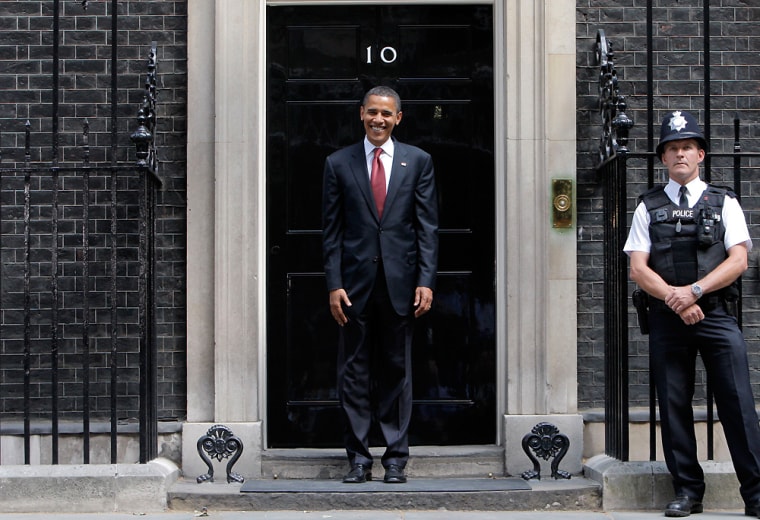There is little question that Barack Obama captured Europe's heart during the tumultuous visit that ended Saturday evening, but hard questions remain about whether Obama, if he wins, could transform that enthusiasm into concrete policy gains.
After the harsh anti-Americanism that has thrived in Europe for most of this decade, it was jarring to see a U.S. politician receive such adoration from the public, press, and the continent's leaders, who seemed almost to swoon in his presence.
Polls show not only that a strong majority in countries like Britain would choose Obama over Republican rival John McCain if they could, but also that the general distaste for the United States has softened somewhat as Obama's White House bid gathers pace.
"Since the race has been going on, we've found a slight movement toward the U.S.," said Anthony Wells, research chief for PoliticsHome in Britain. "I'm confident this is the Obama influence. The anti-Americanism of recent years seems closely tied to George Bush. The people love Obama."
But many analysts believe that if Obama completes his march to the Oval Office, this backing will dissipate the first time he presses Europe to send more troops to Afghanistan or to support an aggressive U.S. military stance at odds with Europe's strong preference for diplomacy over cruise missiles.
They also believe that complex long-standing disputes over issues like trade tariffs and the use of genetically modified food would not be solved more easily just because of the new president's evident popularity in Europe.
Germano Dottori, an analyst at Rome's Center for Strategic Studies, said the enthusiasm for Obama is likely to "cool down at the first real test" because he does not reflect a fundamental policy change.
‘Fade away’
"Everyone is ready to clap their hands when Obama talks about 'tearing down the walls,' but when he asks Europe to pay the price for it I am sure the doubts will resurface," Dottori said. "Obama is not calling for a demilitarization of U.S. foreign policy and when European audiences realize this, their enthusiasm will fade away."
This dynamic can already be seen in Germany. Chancellor Angela Merkel, through her spokesman, showered Obama with praise for his stated desire to work with Europe, but pointed out that Germany cannot accede to his desire to place more troops in Afghanistan for the battle against the Taliban and al-Qaida.
Writing in Germany's mass-circulation Bild newspaper, commentator Hugo Mueller-Vogg also praised Obama's "let's try it together" message to Europe. But he cautioned that it would come with a price. "He will demand a stronger German commitment to international hot spots, more German soldiers too," Mueller-Vogg wrote.
Even some in the crowd who cheered Obama's emotional speech in Berlin anticipated conflicts should Obama become president.
"I thought it was important, his concentration on cooperation with Europe, but I can also say sometimes that cooperation would be difficult," said Pablo Guaneme, a 23-year-old who was in the crowd.
Eric Frey, managing editor of Der Standard newspaper in Vienna, said that an Obama presidency, if it happens, would not mean a complete end to conflicts between Europe and the United States but would bring the two closer together.
"Many of the trans-Atlantic conflicts under Bush were atmospheric, so a change in the White House should pave the way for a new partnership," Frey said. "Concrete disputes will continue in dozens of areas, but the general feeling of drifting apart could be reversed."
Others caution that Europeans expecting a 180-degree change in American foreign policy should Obama triumph will be let down.
Inderjeet Parma, head of the politics department at the University of Manchester in England, said he read every Obama speech since 2002 before concluding that Obama would not represent a basic change in U.S. policy. This would inevitably lead to a serious loss of popularity in Europe, he said.
"Obama hasn't said too much of great substance yet, he's made a lot of friendly overtures, but he'll be asking for commitments and burden sharing, and that's when other countries might find it hard to go along," Parma said.
He said the next president — be it Obama or McCain — will immediately face a number of pressing crises, particularly the dispute with Iran over its possible development of nuclear weapons. He said America is likely to believe these crises can best be solved with a military approach, which may well alienate much of Europe.
More protectionist?
Political analysts also believe that Obama's trade policies, as spelled out during the primary campaign, are more protectionist than McCain's and more likely to lead to a confrontation with Europe.
In France, where President Nicolas Sarkozy has moved closer to the United States on key issues like Afghanistan in the last year, some of Obama's newfound fans believe that if he wins, America will enjoy a new, more positive reputation that could make it easier for European leaders to cooperate on sensitive subjects.
"Obama could give a new breath to the United States and a good image in France," said 18-year-old Simon Heroguer, standing on the chic avenue facing the French presidential palace to watch Obama's arrival Friday.
But Europeans swept up in the excitement of what at times seemed like a coronation of Obama in Europe must remember that words and images that resonate in Berlin, Paris and London may not be as impressive to U.S. voters.
"I think some Europeans don't understand that what plays well here may not be playing well at home," said Anand Menon, director of the European Research Institute at the University of Birmingham in England. "The slogan, 'Barack Obama, the guy the foreigners like' is not necessarily a vote winner in the United States."
